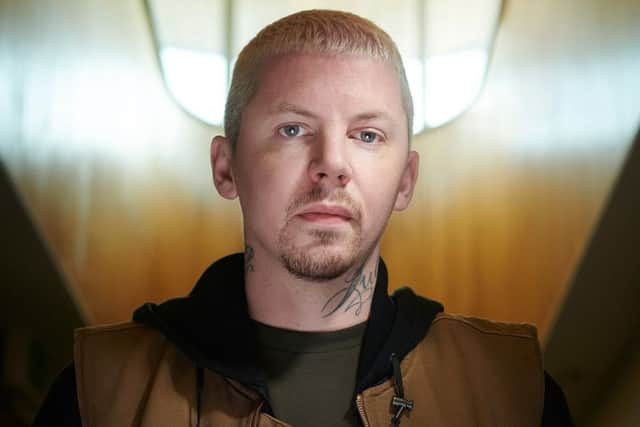Professor Green in conversation at Edge Hill University
and live on Freeview channel 276
Coming from a working-class background himself, in his most recent, no-holds-barred documentary, Working Class White Men, which aired on Channel 4 in January this year, Stephen delved into the lives of six men all from a working-class background.
A documentary which saw Stephen dig into the parallels between his own working-class roots and these men, issues surrounding lack of encouragement and equal education arose in what became an extremely poignant two-part documentary.
Advertisement
Hide AdAdvertisement
Hide AdOn Thursday, Stephen spoke at Edge Hill University as part of the Ormskirk university’s annual Festival of Ideas.


The event, which is now in its third year, is this year focussing on the issue of equality and Stephen was in conversation with panellists speaking about the issues surrounding white working-class men in Britain.
Speaking to the Lancashire Post, Stephen talked about the challenges facing young men from a working-class background, how they view themselves and how television can contribute to displacement.
So, Stephen, you’re clearly a big advocate for raising awareness of key issues in our society. Why do you think it’s important for people, like you, who are in the public eye to speak out about certain issues?
Advertisement
Hide AdAdvertisement
Hide AdI personally just stumbled into speaking about these types of issues, probably because I’m not afraid to answer anything. I tackle questions that most people would rather avoid.


Having grown up always being accountable for everything I did, because of where I grew up, controversial issues is not really something I shy away from.
The music industry can be quite sterile. It’s easy to get swallowed up and now people just want to use their platform for their own advancement in life.
But, I use my platform to engage with people in a way that others can’t.
Advertisement
Hide AdAdvertisement
Hide AdPeople relate to me as I’m someone they actually look like, someone they dress like and someone they sound like.


What are some of the biggest challenges facing youth from a working-class background?
In the documentary I filmed, higher education was a recurring issue, the kids just didn’t see university as something that was ever meant for them, in fact there were many things that they just thought were not afforded to them or for them.
You could go back as far as when welfare was first introduced, young people started to grow up around parents who didn’t work, and so their aspirations have become different.
Advertisement
Hide AdAdvertisement
Hide AdOne thing for sure though is that the age-old glass ceiling is still active and having an effect on our society.
How and why do you think people from a working-class background view themselves so negatively?
Negativity very much has a knock-on effect.
If a kid is told he is the naughty kid in school, then he won’t ever move on from that and will think that is how he should forever be identified. I think this self-fulling prophecy idea has a real damaging effect.
There is actually a line in one of my old songs which sums it up, “told he would never be s*** for so long he believed it” and that kind of attitude becomes self-perpetuating.
Advertisement
Hide AdAdvertisement
Hide AdIs there a possibility that a large amount of this feeling of displacement comes from television and the media these young people are exposed to?
Massively. Look at the likes of Benefit Street, that’s not doing the working class any favours is it?
Despite it not speaking for the majority of people who are on benefits, it’s sadly how people see the working class. Programmes such as that sensationalise the working class – they’re looked at and they’re laughed at.
There are certainly a lot of slurs used in programmes like that that wouldn’t be ‘PC’ to be used on the front of newspapers about other individuals, but these ‘chavs’ as they are labelled, it’s deemed acceptable to do so.
Advertisement
Hide AdAdvertisement
Hide AdFinally, what do you think you brought to Edge Hill University and their topic of equality?
I have seen both sides of the coin. I come from a poor family. I was raised with six of us in a three-bedroom flat, so I can speak as someone who knows a thing or two about what it is to be working class.
But, flip that coin and I can also stand as someone who has made good of that and can demonstrate how it can be turned around.
I don’t have a problem with the privileged, I want my kids to be more privileged than I was, but I just think there is a lack of understanding in society that seriously needs to be addressed. So, hopefully I can spread the message.”
Advertisement
Hide AdAdvertisement
Hide AdStephen’s talk at Edge Hill University was a sold-out event.
During the discussion he engaged with students about the issue of equality among the working class, the difficulties that face them and what exactly can be done to bring about equality in society.
For more information about Edge Hill University and their Festival of Ideas, visit: www.edgehill.ac.uk.